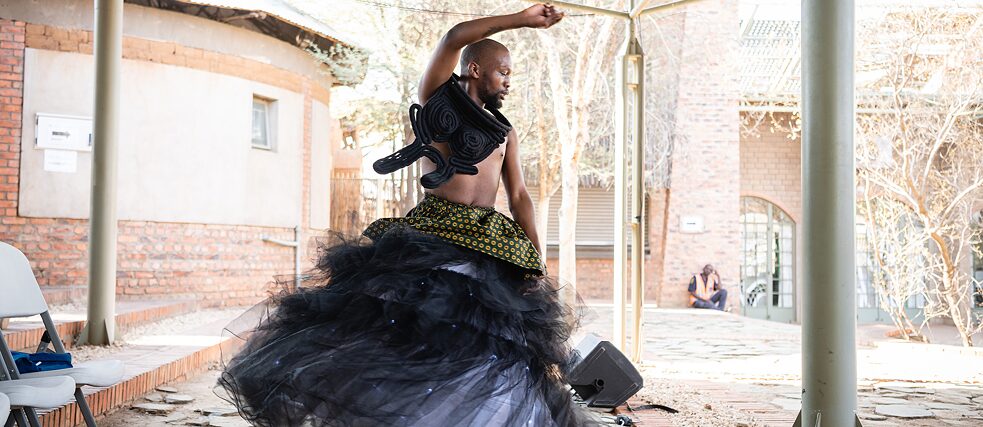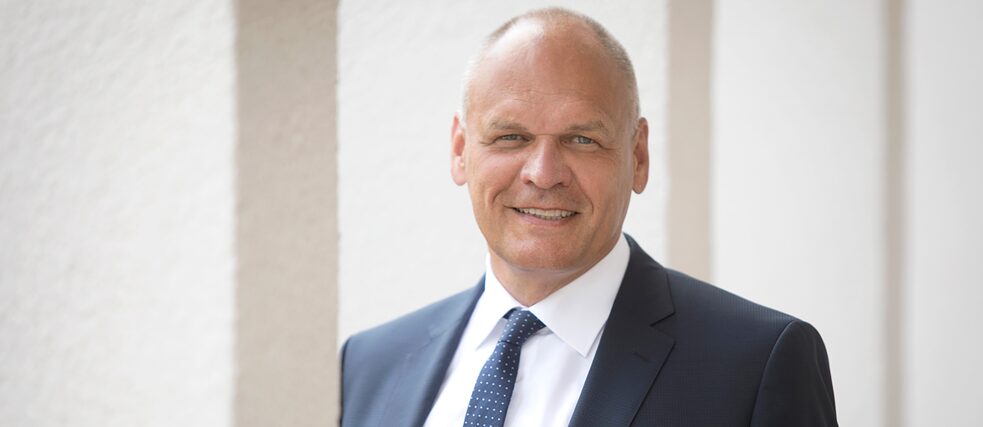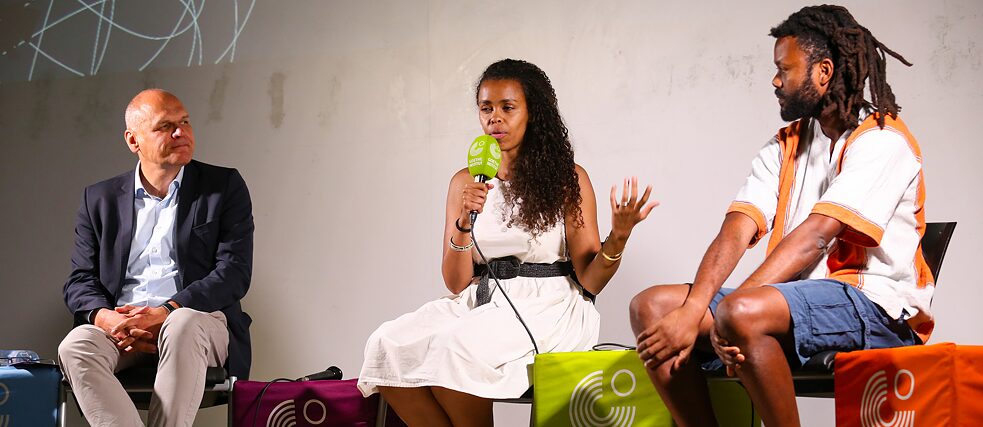New Concepts of Cultural Exchange
Constant Renewal

The present debates about colonialism, racism and restitution also influence the work of the Goethe-Institut. Its Secretary-General Johannes Ebert explains how the cultural work of the Goethe-Institut has changed over the past few decades.
By Johannes Ebert, Secretary-General of the Goethe-Institut
Bénédicte Savoy’s point hit home at the very end: It was in March 2019 in the conference room of the Musée des Civilisations Noires in Dakar, Senegal, newly built with funds from China. Savoy was reporting about her latest research on the history of the restitution of cultural assets from German museums to Africa. In the early 1980s, then Minister of State in the Foreign Office, Hildegard Hamm-Brücher, announced the first returns by the Federal Republic of Germany in the Süddeutsche Zeitung. These plans were then put on hold with the change of government in 1982 and later no longer pursued. The impetus for Bénédicte Savoy’s investigation was a letter to the editor referring to Hamm-Brücher: Under the heading “Send cultural assets back to the jungle?” the writer clearly rejected the return of the art objects, justifying his stance with his concern for the safety of the objects and the reference that there are significantly fewer exhibition pieces from the “peoples of the Third World” in European museums than from other regions of the world. The writer of this letter to the editor from the early 1980s was the head of a Goethe-Institut in Africa.
A lot has happened since then. But the intense debate about German colonialism has only really picked up speed in recent years. In Germany, it was sparked in particular by French President Emmanuel Macron’s announcement that African cultural assets from French museums would be returned and by the various discussions about the future direction of the Humboldt Forum. The role of Germany as a colonial power and issues of restitution have been the focus of numerous conferences. The remains of African ancestors, but also the first cultural assets have been returned. The restitution process has commenced. Coming to terms with colonialism was also prominently included in three parts of the coalition agreement of Germany’s governing parties.
Moving away from presentation towards cooperation and co-production
The Goethe-Institut has also developed and changed in its programmatic cultural work and in its self-image over the past decades. In the 1950s and 1960s, its focus was on presenting cultural life in the young democratic Federal Republic abroad, with the additional aim of being accepted back into the international community after a terrible war and the Holocaust. But since the 1970s, its understanding of partnership-based cultural cooperation has evolved. This programme work, conceptually related to Germany and based on bilateral or European cooperation, is committed to dialogue and is today strongly characterised by concepts such as cooperation and co-production. Johannes Ebert, Secretary-General of the Goethe-Institut. | Photo (detail): © Martin Ebert
Johannes Ebert, Secretary-General of the Goethe-Institut. | Photo (detail): © Martin Ebert
The local Goethe-Instituts are working to openly discuss the era of colonisation and the decolonisation process, therefore also making the dark times of German colonialism an issue. As a critical voice at the New Ethics for Museums in Transitions conference in March of this year in Dar-es-Salam pointed out, a few years ago the institute initially had difficulties supporting a theatre production on the Maji Maji uprising against German colonial rule in Tanzania. But today, these topics are explicitly being addressed by the Goethe-Institut in conferences and art projects. As in every earnest process of reappraisal, this is sometimes painful. However, it is a fundamental human experience that remembering together, which can be painful and conflict-prone in different ways for both sides, is an indispensable prerequisite for moving forward together.
New methods of cultural exchange
New methods of cultural exchange are also being tested. Increasingly, for example, when working in Africa, the conceptual development of projects is placed entirely in the hands of African curators. The Goethe-Institut is a facilitator and a neutral platform, but takes a back seat as a maker and shaper as shown in the multi-year Museum Conversations project, in which museum experts from numerous African countries discussed the challenges and future visions of African museums. The Burden of Memory conference in Cameroon at the end of last year is another example. There, the three curators from Cameroon, South Africa and Kenya decided that cultural professionals from the former German colonies should initially only discuss their different approaches to remembrance amongst themselves before dealing with their European partners.Museum Futures Africa, the follow-up project to the Museum Conversations, is similarly designed. The point is to move from discussion and analysis to concrete action. In particular, collective and reciprocal learning, as is planned for Museum Futures Africa, goes far beyond conventional capacity building in its constant exchange and questioning of models. It points to the future because it understands knowledge not as a one-way street, but as multi-perspective learning in an exchange by all actors.
A strength of the network of foreign cultural and educational policy
Such new concepts of cultural exchange are particularly sustainable if they are not brought in from outside, but rather emerge from the actual circumstances in the country. The local presence of the Goethe-Institut as a companion of sustainable processes proves to be a strength of the network of foreign cultural and educational policy. The SAWA Museum Academy is also committed to collective learning. There, the Sharjah Museum Administration, the Berlin State Museums, the University of Technology and Economics and the Goethe-Institut train future museum staff from the Arab world and Germany according to a tandem principle with digital and presentational programmes on both sides of the Mediterranean. The name says it all: “sawa” means “together” in German.Self-questioning is an important basis for further developing these methods in cultural exchange. The Goethe-Institut Johannesburg, for instance, recently put its role up for public discussion as part of the Power Talks project. It received a lot of praise, but also fundamental criticism that cultural exchange is a way of soothing a guilty conscience and washing oneself clean of guilt. Critics noted that our approach to cultural exchange only works because we have the economic means for it, but that compensation and reparations for the legacy lost during the colonial era would make more sense. Nuances between the two positions became clear and also demonstrated that constant renegotiation is necessary; that cultural emancipation in South Africa, as in other countries in the region, is a process that will accompany us for a long time and that holds a great deal of potential for discussion for both sides.
 Johannes Ebert in Yaoundé with Molemo Moiloa and Nashilongweshipwe Mushaandja at the conference The Burden of Memory. | Photo (detail): © Goethe-Institut/Y. Aboueme
Johannes Ebert in Yaoundé with Molemo Moiloa and Nashilongweshipwe Mushaandja at the conference The Burden of Memory. | Photo (detail): © Goethe-Institut/Y. Aboueme
This requires a learning process to which institutions such as the Goethe-Institut, which work in global contexts, have long been and must still open themselves. This constant renewal is not free from awkward moments, mistakes and different paces. After all, it not only intervenes in institutional culture, but also places high demands on the representatives of this form of cultural exchange.
For German society, which is globally embedded and at the same time internally diverse, there is also no alternative to such a learning process. This is particularly evident in the current debate on racism: Triggered by an incident that occurred in the United States, it is intensifying the long overdue social debate about racially motivated violence against German fellow citizens, as was the case recently in Hanau, and raises the question of structural discrimination against people of colour in our own society.